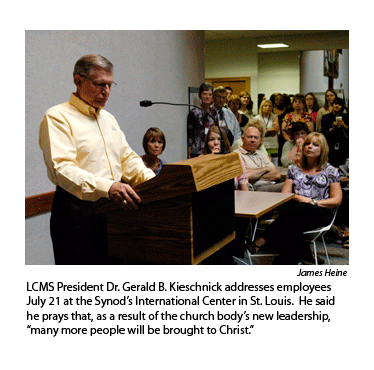Outgoing Synod President Dr. Gerald B. Kieschnick says that, although at age 67 he is “old enough to retire” when he leaves office Sept. 1, retiring “is the farthest thing from my mind.”
He and his wife, Terry, plan to stay in St. Louis while they determine their “future life and ministry,” the Synod presi dent told International Center employees in a brief address July 21 in St. Louis.
dent told International Center employees in a brief address July 21 in St. Louis.
“While I’m disappointed at not being able to continue the work in which I have invested every fiber of my being for nearly a decade, I see the closing of one door as opportunity to find what other doors the Lord might be opening for my future vocational and professional involvement,” Kieschnick told hundreds of employees gathered in the International Center lunchroom.
There is “much yet to be accomplished,” he said, adding that he reflects daily on Psalm 27:14 — “Wait for the Lord; be strong, and let your heart take courage; wait for the Lord.”
The July 13 election of Rev. Matthew C. Harrison as the Synod’s 13th president, Kieschnick said, “will bring, in [Harrison’s] own words, ‘tumultuous change’ in the LCMS. I pray that, as a result of that change, many more people will be brought to Christ through our witness to God’s love, grace, mercy, peace, forgiveness through God’s Word and sacraments, and the promise of eternal life for those who accept what Christ has done for our salvation.
“I also pray fervently that all who were elected last week to positions of leadership will be led, guided and directed by God’s Spirit in the fulfillment of the duties and responsibilities entrusted to their care,” he said. “And I trust that you will work together with all who will soon take office to accomplish that vital endeavor, which has eternal consequences.”
Kieschnick said that the LCMS “is both widely respected for what we believe, teach, and confess and also often suspected of being somewhat schizophrenic in the way we demonstrate our ecclesiastical identity. Sometimes we struggle in determining what direction we really want to go as a national church body.”
He read a description of the “politicized culture” of the Synod prepared by the LCMS Task Force on Synod Harmony: “National and some district conventions have become more politically charged than ever. Political lists have become the norm. The LCMS is becoming a denomination of parties, each seeking to elect its own candidates as leaders. In recent decades, the parties in power are perceived to proceed with a ‘scorched earth’ policy, totally disenfranchising the losing party. Rather than valuing all the voices in the LCMS, the ‘losing’ voices are silenced until they can amass enough votes to gain power and do the same to the other party.”
Kieschnick said that, in his opinion, church politics “all too often divides our well-trained clergy, dispirits our godly lay men and lay women, weakens our witness to the world, and leaves us feeling torn and empty,” and he longs to hear others say of the LCMS, “See how they love one another!”
He added: “How longingly I dream for the LCMS to realize its full potential as a global confessional church leader. I pray that this dream will become reality in the years ahead and that God’s blessing will be upon our Synod’s new leaders toward the accomplishment of that objective.”
Posted July 29, 2010



